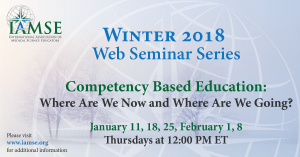
In case you missed yesterday’s Webcast Audio Seminar (WAS) Session, here are the highlights of this session:
Competency-Based Medical Education: Understanding the Principles
Presenter: Linda Snell, MD, MHPE, FRCPC, MACP
January 11, 12 PM EST
Goals of Webinar
- To lay the foundation for future sessions in this series;
- To outline reasons why we need to change our current education system, and how competency-based medical education (CBME) may address these
- To define CBME and common terms that are used when discussing it;
- To enumerate the 5 components of CBME
- To describe models for implementing CBME across the continuum of medical education
Key terms:
- Competency – the thing(s) they need to do.
- Competent – can do all of the things.
- Competence – does all of the things consistently, adapting to contextual and situational needs.
Why change our current education system?
- Today’s medicine is changing in terms of the Profession, Patient and Public safety and access to care.
- How can we as medical educators prepare physicians to be effective in this environment?
- Competence drops over time and there are competency gaps.
Challenges of current education system
- Modern Medical Education is based on time (fixed length of time) and not ability.
- Trainees unprepared to move on
- Tend to assess trainees outside of clinical setting.
- Fail to fail
- Overloaded or burden of faculty
- Education not based on patient or society’s needs
Highlights of the Flexner Report
- Need for fundamental redesign
- Facts and concepts need to be taught, practiced and assessed in the context
- Evaluation of learners must reach beyond knowledge to rigorously assess procedural skills, judgment
- practice until an acceptable level of proficiency is attained
- develop approaches to skills training that do not put our patients at risk in service to education
We need doctors who …
- Are optimally prepared for practice
- Can safely provide complex care
- Can work and lead health care teams
- Maintain / improve their competence in changing contexts
- Possess skills and abilities beyond knowledge
- Knowing > doing > being
We need medical education that …
- Is based on explicit outcomes needed by graduates
- Transparent to learners, teachers, assessors
- Focuses on individual learner needs
- Ensures physician competence increases over time
- Teaches for competence, aims for excellence
- Promotes life-long learning
- Provides ‘right’ amount of time
- Provides public accountability
“We believe that in the future, expertise rather than experience will underlie competency-based practice and…certification.”
Fundamental concepts of CBME
- Education must be based on the health needs of the populations served
- Primary focus of education & training should be desired outcomes for learners rather than structure and process of the system
- The formation of a physician should be integrated across the continuum – UGME > PGME > practice
CBME principles
- Focus on outcomes: graduate abilities
- Ensure progression of competence
- Time is a resource, not framework
- Promote learner centeredness
- Greater transparency & utility
Milestones and EPAs
Milestone:
A defined, observable marker of an individual’s ability along a developmental continuum that expresses the stepwise progression of expertise; ‘significant point in development’
e.g. Respond to patients’ non-verbal communication; use appropriate non-verbal behaviors to enhance communication with patients
Milestones tend to be:
- Applied to a person
- More detailed than competencies
- Clear descriptions, explicit statements
- Expected level of ability
- Observable – link to feedback
Issues Milestones Address
- Progression of Competence
- Authentic Assessment
- Comprehensive Curriculum
- Faculty guidance
- Learner transparency
- Failure to fail
Entrustable Professional Activity (EPA):
A key task of a discipline (profession, specialty, or sub-specialty) that an individual can be trusted to perform without direct supervision in a given health care context, once sufficient competence has been demonstrated.
EPAs Describes a task
- Links competency to clinical context
- Reflects a collection of different competencies as applied to the work of the discipline
Linking EPAs and milestones
- Assessing unstable patients, providing targeted treatment and consulting as needed
- Recognize medical instability
- Address primary priorities of resuscitation (ABCs)
- Perform a focused clinical assessment
- Develop a specific differential diagnosis
- Develop and implement preliminary treatment strategies
- Identify the necessity and urgency of consultation for advanced care
- Document clinical encounters to adequately convey clinical reasoning and the rationale for decisions
- Communicate with the receiving physicians or health care professionals during transitions in care
Core Components of CBME
- Competencies required for practice are clearly articulated.
- Competencies are arranged progressively.
- Learning experiences facilitate the progressive development of competencies.
- Teaching practices promote the progressive development of competencies.
- Assessment practices support and document the progressive development of competencies.
Common competencies within the frameworks
- (Clinical) expertise
- Problem solving
- Health advocacy / prevention
- Communication skills
- Teamwork / collaboration
- Leadership and management
- Teaching skills
- Life-long learning
- Critical appraisal
- Professionalism
For more information on the next session or to register, please click here.